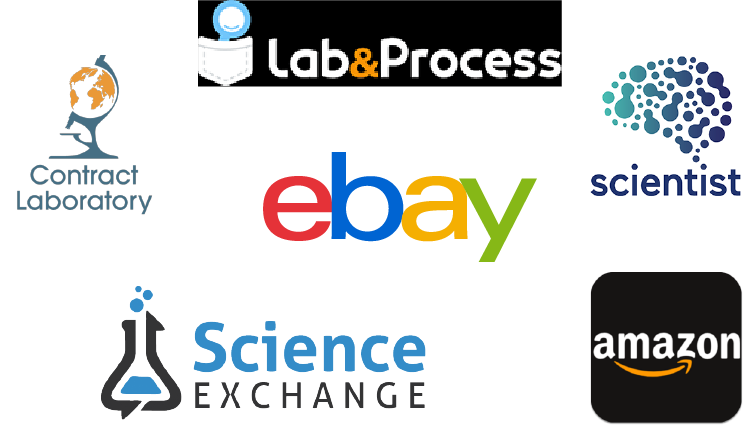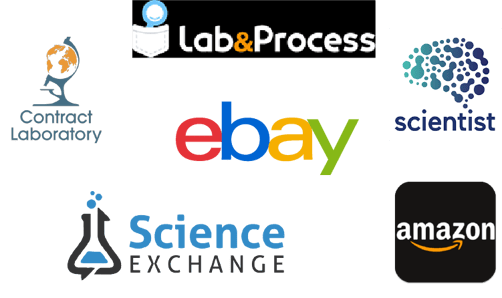
The 3 top marketplaces for research scientists
Lab outsourcing : a new reality for science
How the marketplace is changing research for people in lab coats

Scientists are often thought of as edgy people. They are always trying to invent things that will simplify our lives, cure our illnesses or radically change life as we know it. Thus, thinking that scientists shop online for their high-tech, out-of-this-world research needs, like normal people do, can be a little weird! After all, how could they find what they are looking for on eBay or Amazon? As a follow-up to our blog post on the benefits of outsourcing, this post will focus on how online marketplaces for science work as well as their advantages and disadvantages. And as a bonus, we will tell you what are our top 3 online resources for research scientists!
Just like a normal marketplace, but for science!
When looking for stuff to buy online, you would typically go with one of the two following ways: ask Google, or go to your favorite online marketplace such as Amazon or eBay. As a life science researcher or a pharmaceutical company project manager, you can also use Google to look for a certain service or product. However, you would probably be better off using one of the numerous online marketplaces for science. These websites are usually built to help find a product or an appropriate service provider for your needs. Since they are specialized in scientific experiments, you can be assured that the keywords you type in will only retrieve relevant information…or at least, better than a general search engine would!

And how does it work?
So, how does one use these platforms? Well, just like you would use any common online marketplaces. You first locate the search bar, enter your query and hit enter! Alternatively, some websites offer different categories for you to browse and choose from. If you feel lost or if your project is vastly complex, some platforms also offer complimentary concierge services. If you decide to go with this option, the staff at the website will use their knowledge of scientific service providers to pair you with the most relevant companies so that the process goes as fast and as smoothly as possible.
Sounds good! Which one should I use?
As a service provider ourselves, we can confirm that these sites work great. Since we've been trying several different platforms for our services, we‘d like to share our personal top-three online marketplaces for scientific research!
#1 : Science Exchange (the best out there!)
As we said earlier, we’ve tried several online platforms to promote our services. But as of today, no other online marketplace has served us better than Science Exchange, which regularly works with the top pharma companies and institutions (including Amgen, BMS, Sanofi Genzyme, GSK, etc).
Their website is very intuitive, and people interested in finding service providers can either look on their own or use the concierge service. If they choose to get assistance, the folks at Science Exchange will offer complimentary white glove service with highly qualified agents (M.Sc. or Ph.D.) to get the requester the "most qualified service provider for [their] projects".
Service providers can create their own storefront on the Science Exchange platform. If you are curious about how a company page can look on such a platform, have a look at our page on Science Exchange.
Their platform is so well-built, we’ve even had clients outside of Science Exchange go through their service to facilitate the transaction. They're that good!
Advantages
- Works with 17 out of the top 20 pharma companies
- Science Exchange does stringent, independent audits of service providers, then gives requesters information on past provider performance and quality assurance
- Requesters frequently rate their experience very positively, and suppliers can benefit from repeat requests
- Efficient concierge service that provides start-to-finish project management, even for complex projects
- Well-built contracts that facilitate money transfers and IP protection
- Science Exchange’s own regulatory compliance team handles projects requiring regulated work
- The website is ISO 9001- and SOC 2-certified, to meet the needs of biopharma researchers requiring security and confidentiality
- Offers creative, high-quality marketing services for suppliers (at an extra cost)
- Very friendly and responsive staff – you can feel the human connection with them
- Quality service providers (like Allumiqs!) get high numbers of quote requests
Drawbacks
- Does not allow e-mail sharing on the platform – though this can be seen as a positive by industry scientists concerned about confidentiality
Cost (to Service Providers)
- No charge (although requesters pay a transaction fee on every closed deal)
#2 : Scientist
The Scientist, formerly known as Assay Depot, is one of the main online marketplaces in North America. This website is used by the FDA as well as by some big players in the pharma industry (like Merck and AstraZeneca) to get quotes for projects. Whether you are the provider or the requester, this platform has the power to bring very interested people together to make science go forward. Of note, the Scientist has very dedicated customer service agents that can help both requester and service provider to get the best out of their website.
Advantages
- Regroup a lot of big players (service providers and requesters) of the pharma industry
- You can expect very qualified service providers (certifications, ISO, and so on) if that’s what you need
- Ask for very specific things to save time by avoiding bad fits for your projects
- The staff is very responsive to your requests/questions
Drawbacks
- We've experienced a low response rate to our quotes (this doesn’t affect the requesters!)
- Some requests are so specific that you feel that they were written for one provider only
- The emails sent by the website are very frequent
Cost (to Service Providers)
- 5% of closed deals
#3 : Contract Laboratory
Unlike other online marketplaces, Contract Laboratory works mainly as a giant bulletin board. Requesters can create an account and can display their requests on the website. On the other side, the service providers can browse through the different requests and quote on the ones for which they have the expertise. One of the main advantages of Contract Laboratory is that they display the email of the requester so that as soon as a contact has been made between the provider and the requester, the discussion can continue outside of the platform. This can be a plus if the requester wants to save money on the transaction, or if they want to make sure that their information is not on the Internet (although the website is secured!). However, if you want your details to remain hidden, you always have the option to do so. If that’s the case, the service provider will not be able to see your information until you want them to.
Advantages
- Relatively high number of requests
- The info of the requester is readily available
- Covers a very wide range of technological requests
- Biology
- Chemistry
- Physics
- Motors and locomotion
- Nutraceutical
- and much more!
Drawbacks
- Every response to a request has to be reviewed before being actually sent
- Once sent, the formatting of the response can be weird. The website asks for three different sections to be filled before the response is sent to the requester. However, once submitted, the text in every one of these sections is merged, and all the formatting you did is lost during the merge.
The cost
- Yearly plan to get access
Conclusions
The online market has gotten access to science in the past few years. There are dozens of different online marketplaces for people to either sell or buy science-related services and products. In this blog post, we wanted to explain what marketplaces are available for science-related industries and to share our favorite top 3 platforms. If you are interested in sharing yours, start a discussion below!
Honorable mentions
Lab&Process
Lab&process was founded by a French entrepreneur named Yves Arnaud. This website primarily advertises products and services from Europe, but can also host providers from other continents (just like us!). One of the main advantages this website has over other providers is that you only pay when a lead is generated, if your annual revenues are under a certain tier. This way, service providers get to be advertised at no cost, as long as they don't generate leads. Free advertising in front of an interested audience, anyone?
Labs Explorer
Labs Explorer is a great online platform to connect labs together. It's a good place to look for R&D partnerships and service providers.
